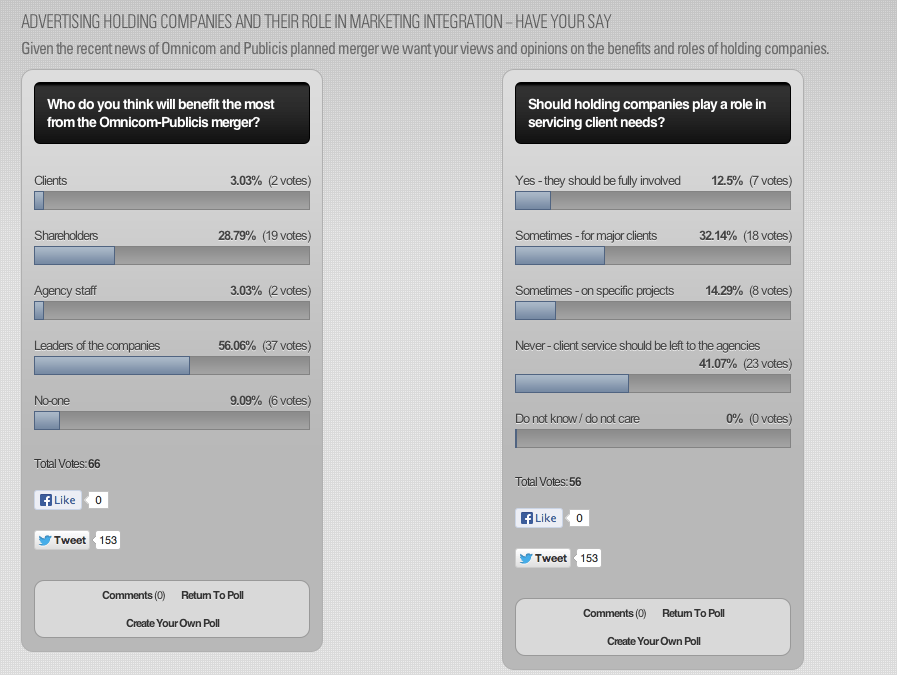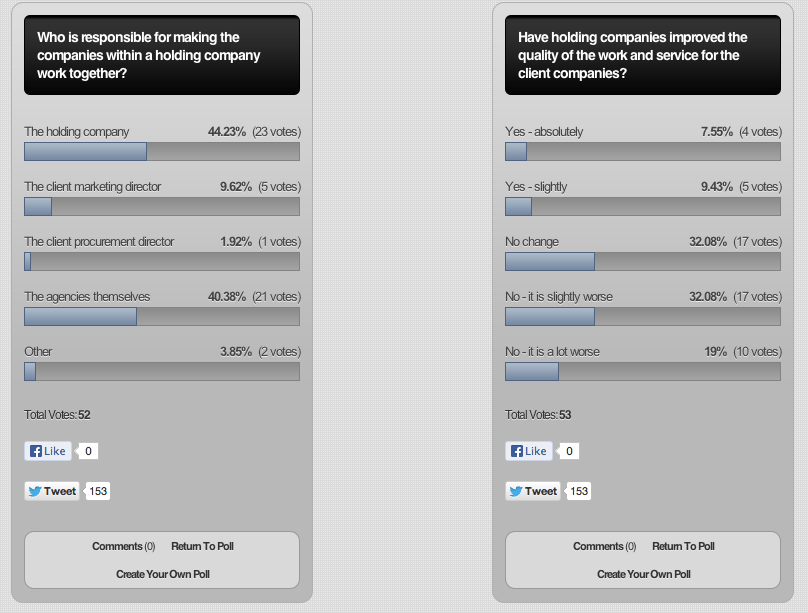Flock Associates Survey Reveals Industry Skepticism over Publicis Omnicom Merger And The Role Of Holding Companies In Driving Marketing Integration
Flock Associates has been running a survey on its website, looking at the role of holding companies in marketing integration, since the morning of Monday 29th July and following the news of the Publicis Omnicom merger. The results of the survey highlight precisely why the industry needs a new force – an integrator – to make sense of the colossal changes taking place.
As of noon on 4th August the survey had attracted over 300 respondents from across the world and all aspects of the marketing ecosystem. The survey is still live and you can have your say by clicking on this link: https://www.flock-associates.com/points-of-view/survey/
The results are shown below:
It is telling that only 3% of respondents believe that clients will benefit most from the Publicis-Omnicom merger, despite the proclamations of Publicis Omnicom that the merger would benefit clients.
Only 3% of respondents felt that the primary beneficiaries of the merger would the staff – the supposed heart-blood of any marketing services company.
Over 50% of respondents think the quality of work and service has got worse as a result of holding company dominance, with only 8% thinking it has got better.
So, why did the merger go through if it is so poorly thought of by the industry for clients and staff? Well, the answer probably lies in the fact that 58% thought the individual leaders of the companies had most to gain, and 29% assumed the shareholders had most to gain.
This merger, as so many take overs and acquisitions before them, appears to have been done purely for the good of the leadership and shareholders, at the expense of clients, staff, and the quality of the work.
It’s seems like another clear sign of the industry “eating itself”.
Despite all the noise from all the companies of “holding company solutions” (where a client can get all their services from the one holding company) these have had, at best, mixed results. For example Flock are aware of five “holding company solutions” that have ended up in courts, where contractual terms have been breached. However, there is opportunity for the smartest and best resourced clients, several of which have been able to make “holding company solutions” a genuine success.
We have been talking with three clients who have asked our opinion of their holding company strategy, and I’m sure more will consider it. This is because clients know they cannot get impartial advice from agencies or holding companies, and that pitch consultants can only appoint agencies, but rarely have the experience or skills to get agencies to work together (whether they are from one holding company, or indeed from several).
Our view is that the client must be very clear of what they want from their agencies, and how they want them to work together. They must specify the ways of working, and the outcomes they desire, and then align a holding company to these. The alignment solutions will include:
- contractual terms
- appraisal systems
- pay, bonus and malus
- the application of integration technologies
- and regular reporting of well defined KPI’s
But, at all times the client must lead the relationship. So far no holding company has yet come up with a truly effective way of getting their agencies to cooperate and integrate, without a great client. This is why holding company pitches are so often riven with politics, and disintegration – rather than the seamless integration promised by each holding company. As an example of how bad internal politics can become inside holding companies, when Simon Francis (CEO of Flock Associates) ran Saatchi & Saatchi he once spent an hour and a half arguing with the head of a holding companies media agencies. The cause of the argument? A £6k cross charge invoice which had been authorised by the leader of the holding company personally! Each success of holding company structures, that we know of, is due to a strong client. Some of the benefits that these strong clients have been able to gain have been the following:
- better effectiveness through better integration (media, creative, research, production, etc)
- aggregated and applied data
- savings through de-duplication of effort
- savings through media and production platform consolidation
- savings at the client through less agency administration
- savings through better best practise dissemination
- greater proactivity from resources
- first port of call for innovation
- Whilst there may be some savings through consolidated fee negotiations, most successful clients have not started with this as the objective
So, in summary, despite skepticism about the Publicis Omnicom deal and the role of holding companies in driving integration, for a strong client there can be benefits. If you’d like to develop and implement a holding company strategy, and access the benefits of the strongest clients, why not pop in to our new offices for a cup of coffee?
If you want to know more about how Flock can help you, contact us here.
Comment Policy
Thanks for visiting the Flock Blogging page, where we welcome your comments. Since this is a moderated blog, all comments will be reviewed prior to posting. As a result, there will be a delay in the posting of comments and not all comments will be posted. Comments may also be removed after they are posted. Thank you for your understanding.






